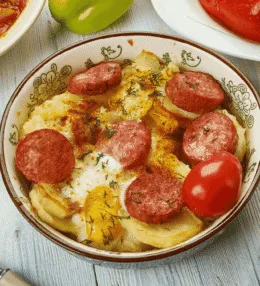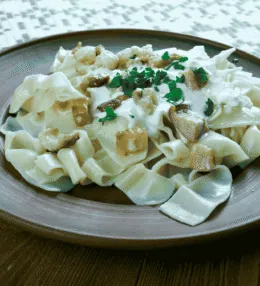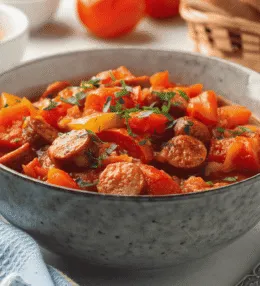
- View
Table of Contents
ToggleRiguas, a beloved traditional dish from El Salvador, are a simple yet flavourful treat that perfectly captures the essence of Salvadoran cuisine.
These delightful corn cakes, wrapped in banana leaves and cooked to golden perfection, are a testament to the country’s deep connection to its agricultural roots.
Often enjoyed as a snack or side dish, Riguas offer a taste of El Salvador’s rich culinary heritage, blending humble ingredients with authentic flavours that are both comforting and satisfying.
Want to dive deeper into Salvadoran Cuisine? Don’t miss our post on 26 Traditional Salvadoran Foods to Try
What Are Riguas?
Riguas are handmade corn cakes made from freshly ground corn dough, known as masa, mixed with a touch of sugar and cream to create a soft, slightly sweet batter.
The mixture is then spooned onto a banana leaf, folded, and cooked on a griddle or over an open flame until the cake is golden brown and infused with the subtle aroma of the banana leaf.
Traditionally eaten warm, Riguas are versatile, they can be enjoyed on their own, paired with crema (a type of Salvadoran sour cream), or topped with cheese for an extra layer of richness.
In rural communities, they’re a favourite morning or afternoon snack, while in urban settings, they’re often sold by street vendors, bringing a taste of tradition to bustling city streets.
Ingredients and Taste
The key to authentic Riguas lies in their simplicity and the quality of their ingredients. Fresh corn is the star of the dish, providing a naturally sweet and earthy flavour that forms the foundation of the cake.
The addition of sugar enhances the sweetness, while the cream adds a smooth richness to the texture. Salt is used sparingly, just enough to balance the sweetness without overwhelming it.
The banana leaf is not just a wrapping but a flavour enhancer. As the Riguas cook, the leaves impart a subtle, smoky aroma that complements the sweetness of the corn.
When bitten into, Riguas are soft and moist, with a slightly crisp exterior that gives way to a tender, flavourful interior. Their taste is reminiscent of freshly picked corn, but with a depth and creaminess that make them irresistible.
A Taste of History
The origins of Riguas are deeply rooted in El Salvador’s agricultural traditions, where corn has been a staple crop for centuries. Corn, or maíz, is considered sacred in many Mesoamerican cultures and has long been a symbol of sustenance and community.
Riguas, like many Salvadoran dishes, reflect the resourcefulness and creativity of rural life, where every part of the corn plant is used, and simple ingredients are transformed into something extraordinary.
The use of banana leaves in Riguas highlights another important aspect of Salvadoran cuisine: the integration of native ingredients that not only enhance flavour but also respect the environment.
Wrapping food in banana leaves is an ancient practice that predates colonization, preserving the cultural and culinary techniques of the indigenous peoples of the region.

Salvadoran Riguas (Corn Cakes)
Equipment
- Mixing bowl
- Fork (for mashing corn, optional)
- Steamer or pot with steamer insert
- Parchment paper or Banana leaves
- Knife or scissors (for cutting wraps)
Ingredients
- 2 cups of masa harina corn dough flour
- 1 cup of fresh corn kernels or frozen corn, thawed
- 2 tablespoons of sugar
- 1 teaspoon of baking powder
- 1/2 teaspoon of salt
- 1/4 cup of unsalted butter melted
- 1/2 cup of coconut milk or regular milk
- 1/4 cup of water
- 2 tablespoons of grated cheese optional, for added flavour
Instructions
- Begin by preparing your masa dough. In a large bowl, combine the masa harina, sugar, baking powder, and salt. Mix the dry ingredients together thoroughly, ensuring they are well incorporated. Add the melted butter, coconut milk, and water to the dry mix. Use your hands to knead everything together until the dough is soft and smooth, similar to a thick cookie dough texture. For a smoother dough, feel free to add a little more coconut milk if necessary.
- Add the fresh or thawed corn kernels to the dough mixture. You can lightly mash the corn with a fork if you'd like smaller pieces incorporated into the dough, or leave them whole for added texture. Mix the corn evenly into the dough, making sure that it is well distributed throughout the masa. This will create a hearty, flavourful base for your Riguas.
- Once your dough is ready, it's time to form the Riguas. Take a small portion of the dough (about the size of a golf ball) and roll it into a ball. Flatten the ball into a thick patty, about 2-3 inches in diameter. The Riguas should have a rustic, chunky shape to them, reflecting their traditional nature.
- Prepare your banana leaves or parchment paper for wrapping the Riguas. If using banana leaves, soften them by passing them over an open flame or boiling them briefly, as this will make them more pliable. Cut the banana leaves into squares large enough to wrap each Rigua individually. If you're using parchment paper, simply cut the paper into squares of the same size.
- Place each Rigua on a piece of the banana leaf or parchment paper. Carefully fold the leaf or paper over the dough, making sure it's wrapped tightly, but not overly compressed. The wrapper will help the Riguas retain moisture and achieve the perfect texture while cooking.
- Once all your Riguas are wrapped, prepare a large steamer or a pot with a steamer insert. Bring water to a simmer in the bottom of the pot. Arrange the wrapped Riguas in the steamer, ensuring they are not crowded or stacked on top of one another. Cover the pot with a lid and steam the Riguas for about 25-30 minutes, or until they are firm to the touch and the dough has cooked through.
- While steaming, check periodically to ensure there’s enough water in the pot to prevent burning. You can add a little more water if necessary. If you’re feeling adventurous, consider adding a few cinnamon sticks or whole cloves to the water for an aromatic infusion that will subtly flavour the Riguas as they steam.
- Once cooked, remove the Riguas from the steamer and let them cool slightly before unwrapping. Serve warm, either as a savoury snack or a side dish. For an extra touch of authenticity, top with a dollop of sour cream, a sprinkle of crumbled cheese, or a few slices of avocado. The Riguas can also be enjoyed with a hot cup of Salvadoran coffee or as a complement to your favourite hearty stew.
Nutrition
You May Also Like










